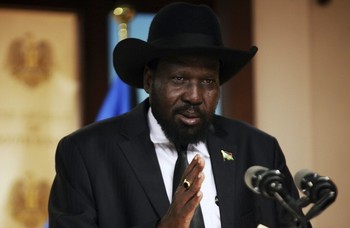Kiir threatens to sack cabinet members who speak against government
May 1, 2013 (JUBA) – South Sudanese president Salva Kiir Mayardit says he will no longer tolerate members of his cabinet accusing the government they serve in of corruption, arbitrary arrest and human rights issues.

“We are a new country. This is why the whole world has turned to us and [is] watching closely to see what we are doing. It is not because what is happening in this country is not happening in other countries. It is because we are [a] new nation and people want to know how we are governing ourselves. They want to know how we are managing our wealth, our resources”, Kiir told the audience, which predominantly consisted of members of his cabinet, ministers and senior civil servants.
He warned that he will no longer turn a blind eye to those in the cabinet who go outside the country to accuse his government of mismanaging the affairs of the nation while serving the same system.
“There is no problem with the world watching and telling us to improve where we are going wrong. It is true there are some things we are not going well. We will work to improve. The problem is that we have our own people, some of them are part of the same system working in the same government but go out [of South Sudan] to talk about corruption and arbitrary arrest carried out by the government. They talk as if they are not part of it but if you follow them, you find they are the same people who are the ones involved in corruption. They are the ones involved in arbitrary arrest, but they come out in the day and say they are not part of it”, he said.
The former rebel commander turned politician became president of an independent South Sudan in 2011, having become leader of the Sudan People’s Liberation Movement (SPLM) in 2005. Kiir said that from now on he will be tracking what cabinet ministers do and say when they leave the capital, Juba.
The president appears to have been reacting to the annual human rights report of the United States, which highlighted areas of concern in South Sudan, most notably corruption and human rights abuses, often committed by the country’s security forces.
It is believed that most arbitrary arrests in South Sudan are carried out at the instructions of more senior government officials both at federal and state levels. Some observers claim that many officials use it as an alternative method for silencing political opponents and critics of their performance.
(ST)
